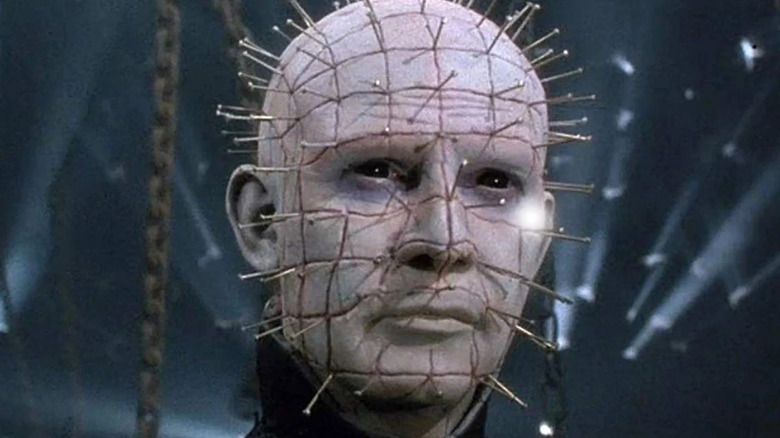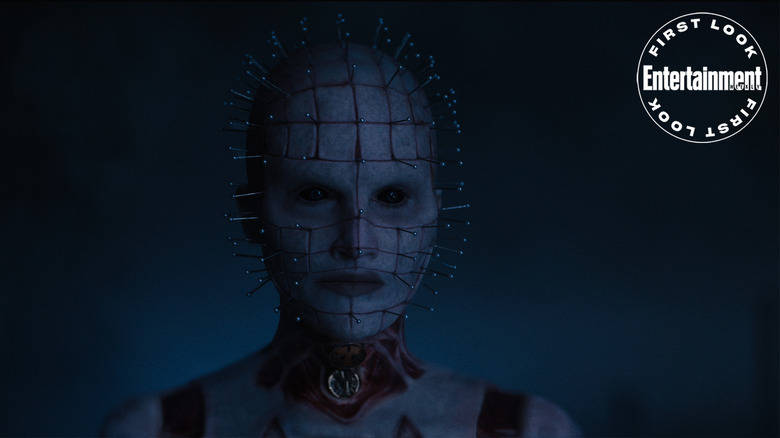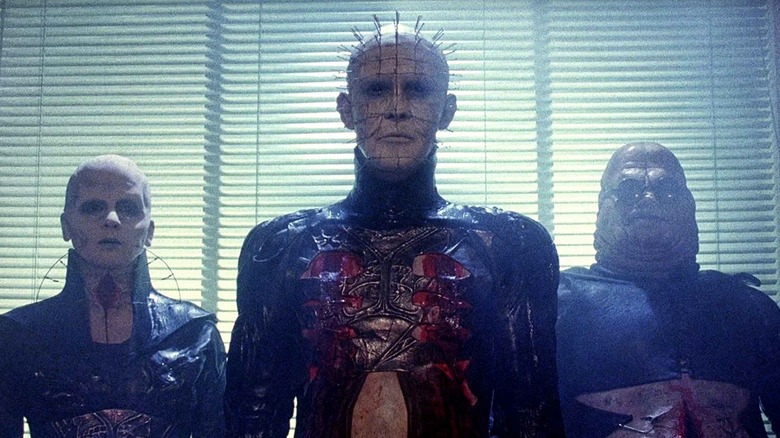The Hellraiser Reboot Got A Helping Hand From Original Creator Clive Barker
Author Clive Barker first wrote his novella "The Hellbound Heart" in 1986, and introduced the complex, visceral mythology of the Cenobites into the world. The story goes that seekers of the ultimate sensual experience will, in their search, find an elaborate puzzle box that requires solitude and concentration — and a good deal of obsessive focus — to solve. When open, the puzzle magically summons a group of mutilate sadomasochists from beyond the grave. They immediately take on the roles of S&M doms, and torture their charge to death, showing them that pain and pleasure are essentially the same experience.
Barker adapted "The Hellbount Heart" to film in 1987 as "Hellraiser," a low-budget horror movie that struck a deep chord with horror fans. Unique within the genre, "Hellraiser" was no slasher movie (despite its copious amounts of blood and gore). The lead Cenobite, later nicknamed Pinhead (Doug Bradley) wasn't a madman who want to stalk and kill his victims, but a dark guide through a sexual experience so intense it often left its practitioners literally in pieces.
After numerous sequels, a remake of the original "Hellraiser" was initially floated way back in 2006, and production started in 2007. The project moved in and out of development for many years, with various directors and stars attached. At one point, Barker himself even wrote a new screenplay. The "Hellraiser" remake, after 15 years of mutations, will finally arrive on Hulu in October of 2022, with David Bruckner directing, Luke Piotrowsky and Ben Collins writing, and Jamie Clayton as the new Pinhead.
In a recent interview with EW, Bruckner revealed that Barker was constantly present for the 2022 film, giving advice and blessings.
Back in 1987
Bruckner, born in the late 1970s, admits to being taken with the 1987 original when he first saw it as a teen. Because of the film's intense subject matter and extreme visuals, Brucker, as any nascent horror-loving teen would, fell under its spell. The story's sexual frankness certainly take it a long way in terms of its impact on a young memory. Eschewing an all-too-common impulse toward flippant machismo, Brucker openly admits that "Hellraiser" actually frightened him.
"It was so visceral and so impactful. It was a movie that really really scared me. It's digging into things that are so troubling that I was almost afraid of the people that created it!"
Brucker seems to have faced his fears, however, as Clive Barker himself was one of the producers on the new "Hellraiser." Barker, in addition to writing and directing the 1987 original, also served as producer on the second, third, and fourth "Hellraiser" movies. Barker was not involved with the production of "Hellraisers" 5 through 10. Brucker was able to discuss "Hellraiser" with Barker and felt blessed that Barker let him recreate "Hellraiser" in his own image. Bruckner said:
"Clive came on before the shoot, when we were in prep, and was really just a wonderful resource for me. He was really generous with his time, and very welcoming of the idea that this was a new group of artists, and that they were going to run with this and land in different places with it. He was very supportive of that."
It's been a long, bloody road
Given the extended trend of remaking horror movies (a trend that has now lasted longer than the wave of slasher films that inspired it), getting the active blessing of the original author appears to be something of a coup. "Hellraiser" has been many things over the years, and there are, truth be told, far more bad "Hellraiser" movies than good ones. "Hellbound: Hellraiser II" (1988) epxanded "Hellraiser" and made it epic and surreal. "Hellraiser III: Hell on Earth" (1992) was the American studio version, meaning it came to resemble a dumb slasher (with a Cenobite festooned with CDs!). "Hellraiser: Bloodline" (1996) attempted to put the series on a broader historical timeline and climaxed in outer space. It's better than it sounds, despite a directing credit from Alan Smithee (the pseudonym used by directors who want their name removed from a film).
The series then went straight to video, and it was all kind of downhill from there. "Hellraiser: Inferno" (2000), "Hellraiser: Hellseeker" (2002), and "Hellraiser: Deader" (2005) boringly turned Hell back into the punitive, Christian version of the realm, and they all featured the same twist ending: it turns out the protagonist was in Hell all along. "Hellraiser: Hellworld" (2005) took a meta approach and is set in a world where "Hellraiser" is just a movie and its fans attend masked raves (!). Doug Bradley then left the series and "Hellraiser: Revelations" (2011) and "Hellraiser: Judgement" (2018) both featured new Pinheads and, weirdly, new mythologies.
The new "Hellraiser," in having Barker's tacit approval, is not just an advantage for Bruckner. It means "Hellraiser" enthusiasts may be getting back to classic ideas from the original. Thank heaven.


